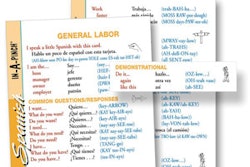Today I am going to help you resolve one of the biggest headaches contractors face: finding and hiring good help.
If you struggle with that, you are probably a non-union contractor. The suggestions contained herein could be a life saver for you.
Your struggles probably generate from three obstacles:
- Providing full-time work.
- Getting the word out to potential candidates.
- Can't afford proven, skilled workers.
Let's take each one at a time and explore solutions.
Providing Full-Time Work
Construction workers keep very close track of the hours they work. Hours are about the most important issue to them - much more so than the hourly pay. If you want to be able to bring in and retain good workers, your task will be much easier if you manage to get them close to 2,000 hours a year.
You do that by aggressively marketing and selling your services.
If you need tips on how to market and sell, read my report (10 Biggest Mistakes Contractors Make and How to Correct Them) or contact me via telephone or e-mail. Back to our topic.
Several trades in cold weather states are going to have trouble getting their workers 2,000 hours because their work requires good weather (site utilities, paving, concrete). In cold weather states, the construction season is pretty short and there isn't much you can do about it.
If you find yourself in that situation, you need to find temporary winter work for your key workers. That way they can afford to work for you during the season.
You might want to buy and remodel houses during your off season. You could try to find another company whose seasonal work is the exact opposite of yours. They are not easy to find, but some are out there.
Getting the Word Out to Potential Candidates
If you struggle generating interest in your job openings, you probably are using the most common methods of publicizing your opening: newspaper help wanted classifieds and the online services such as monster.com.
There are two problems with those approaches. The first is that your ad competes against your competitors' ads. The second is that many construction workers do not read the local newspaper.
I have a few out-of-the-box suggestions for you to try.
If you are a member of ABC, tap their training pool.
They provide non-union skill training for a handful of trades.
Now, I'm not promoting non-union over union, but if you are a non-union shop then you should look into ABC. If their local office doesn't provide training for the type of workers you need, they most likely will have recommendations for where to find them.
Right at the moment, one of the best places to find workers is on a web site named Craig's List (www.craigslist.com). Craig's List is meant to be an online classified section and it is used primarily to sell used stuff, like furniture, but it also has a Jobs section. The Jobs section has a category for skilled labor, which for the most part is a listing of open construction positions. Unbelievably, the job listings are FREE and the responses tend to be HUGE.
A handful of my clients have used the service recently and enjoyed spectacular results. They were flooded with quality candidates. The responses far exceeded the numbers and quality they were receiving from traditional, high-cost help wanted ads. Apparently, younger workers have flocked to Craig's List to find jobs. To maximize the effectiveness of your Craig's List ad, you need to update it daily. That keeps the ad at the top of the list and easy to spot.
If you are open to using Hispanic workers, which you should be, go visit their community churches and let it be known that you have openings. Often, churches know of young adults who are looking for a chance to prove themselves - a chance to better their lives through hard work.
Another proven approach is to place a help wanted ad in the local Hispanic newspaper. You will probably enjoy far better results than by placing a help wanted ad in your local big city paper.
Another place to network into is local high schools and vocational schools. They are jam packed with young men who have no interest in going to college and no longer find the military to be an attractive option. Get to know the vo-tech teachers. They will point graduates in your direction once they know you are an upstanding businessman.
Another group to network with is superintendents who work for general contractors. Supers have first-hand knowledge of the various trades' foremen and crew leaders. Develop a relationship with those supers and at the least you will have a great reference check. At the best you will have an inside track on the up and coming foremen.
Other options are to scout out your competition. Watch them work. Do that cautiously. You don't want to start a labor war, but on the other hand, unless you are going to hire inexperienced workers, you are stealing your workers from someone else anyway. It's like the Godfather said "take it to the mat." You're in competition for both good clients and good workers. You'd better embrace the fight. Otherwise, you will never achieve financial security.
Can't Afford Proven, Skilled Workers
Be prepared to train your new workers and foremen. If you are a small contractor you've probably already learned how difficult it is to recruit and pay for highly experienced workers. If they are available and interested in working for you, they usually bring either heavy wage demands or heavy personal baggage. Those that are experienced and don't have baggage are almost always gainfully employed and not easily pried away from their current company.
As a small contractor, you need to focus on finding eager-to-learn, hard-working employees. Then mold them in the image that you want them to be. Teach them how to do the work the way you want it done. Encourage them to step up and take pride in their work. This type of worker can be hired for a much more reasonable rate.
What more could you ask for in a new worker anyway? Work ethic almost always trumps work experience when it comes to getting things done on time and correctly.





















